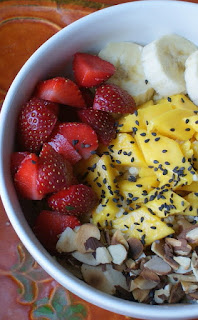An old
saying goes: “Eat like a king in the morning, like a prince at
lunchtime, and like a beggar in the evening.” This is still true for us today:
a healthy, well-balanced breakfast provides the energy required for the day. We often skip breakfast because we get too busy in the morning or
do not feel hungry. If we forgo the first meal of the day, our blood sugar will be low, we will feel tired and have shorter attention span in the morning. That's because after 8-10 hours of fasting at night the glucose levels significantly drop and they have to be restored in the morning so we can normally function. Glucose generates energy for the body and is vital for the brain.
Huge
breakfast consisting of heavy, hard to digest foods is equally bad as not
eating anything at all. In the morning, our digestive system has not yet reached
its maximum strength and is not ready to break down and absorb nutrients from a
heavy meal. It reaches its highest potency later, at a lunchtime. That’s why lunch, not breakfast, should be the largest meal of the day.
Breakfast needs to be balanced and healthy to refuel
our bodies and bring the sugar levels back to normal. It should be easy to digest, nourishing, lightly spiced up, and include a variety of ingredients. We need carbohydrates
that will be slowly released into the blood stream over a longer period of
time. Whole grains that provide complex carbohydrates are important component of a healthy breakfast because they take longer to break down into blood glucose and offer indigestible fibers that aid in gut health and swift bowel
movement.
A bowl of fully cooked, possibly gluten free whole grains mixed with seeds, nuts and dried or fresh fruits will be a great, nourishing and balancing the body and mind breakfast choice. A small amount of clarified butter (ghee) added to the grains, will stimulate the digestion and increase the absorption of nutrients.
In
this recipe I used millet, but it can be replaced by other grains, such as: oats,
buckwheat, quinoa, rice, amaranth, or a combination of two or three different
grains mixed together, depending on what you like and what serves you best. I
added fruit, which according to Ayurveda,
“is like gold in the morning” because at this time of day we can absorb the
maximum nourishment from it. I chose strawberries, now in season, mango and
banana, which have fantastic nutritional values and amazing tastes.
A few facts about the key health benefits
of these fruits:
·
Mangoes provide vitamins
C and A, dietary fiber, potassium and protective nutrients. The antioxidant
compounds in mangoes fight against cancers.
· Strawberries are
believed to help reduce the risk of heart disease and certain cancers. They are low in
calories and high in vitamins C, B6, K, fiber, folic acid, potassium and amino
acids.
Bananas are a great
source of
potassium, fiber, vitamin B6 and C, and various antioxidants and phytonutrients.
Topping
the bowl with a handful of crunchy toasted almonds will not only enhance the meal’s taste but
will also enrich it with unsaturated fatty acids, dietary fiber, protein,
vitamin E, riboflavin, magnesium, manganese, copper, antioxidant flavonoids and
phytosterols.
Ingredients:
- 11/2 cup millet, cooked and fluffed
- 10-12 small and sweet organic strawberries, cut in quarters
- 1 medium yellow mango, chopped
- 1 banana, sliced
- 1/4 cup sliced almonds, lightly toasted
- 1 tsp agave nectar or honey
- 1 tbsp clarified butter or olive oil
- 1/2 tsp ground turmeric
- 2 tsp shredded coconut
- 1 tsp black sesame or poppy seeds
- pinch of salt
Divide the millet and other ingredients between two bowls - about 3/4 cup of millet per bowl. Add olive oil or clarified butter and honey or agave nectar, salt and turmeric to the millet and stir it well. Sprinkle the shredded coconut on top of the millet and arrange the sliced banana, chopped strawberries, mango and toasted almonds. Sprinkle the mango with black sesame
or poppy seeds.
or poppy seeds.
Tip: Millet can be cooked
a day before and warmed up before breakfast with about 1/8 cup of water. Bring
it to a simmer, turn off the heat after about 30 seconds. Cover and let it sit
for about 5 minutes. Fluff it up with a fork. It should be eaten warm.


Warning: Millet,
regardless of its great nutritional value, should be eaten in moderation,
preferably once a week or less. It contains goitrogens, substances that suppress thyroid
activity and when eaten in large quantities may lead to thyroid imbalances. Millet is not
recommended for people with hyphothyroidism.

